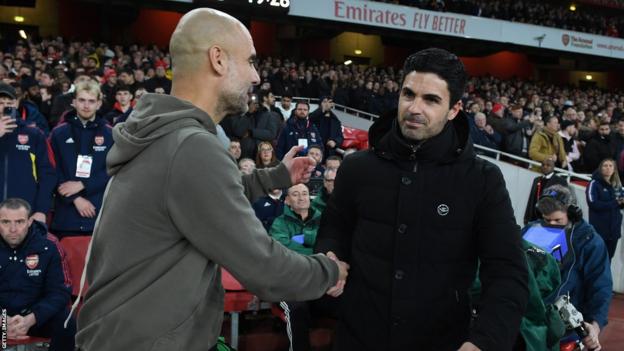[ad_1]

Manchester City manager Pep Guardiola and Arsenal boss Mikel Arteta go back a long way. The Spaniards’ relationship started in 1997 when Arteta joined Barcelona’s academy – meeting his idol and Barca skipper Guardiola. Their time as team-mates was brief but a friendship had been forged and continued when Guardiola made him his assistant at Etihad Stadium in 2016.
As the pair prepare to go head to head when their title-chasing sides meet in the Premier League on Sunday, Spanish football expert Guillem Balague looks at the similarities and differences between the pair. Guillem will also be appearing on Saturday’s Football Focus – available to watch in the UK on BBC One and the BBC iPlayer from 12:00-13:00 GMT.
There is plenty Pep Guardiola and Mikel Arteta have in common.
On the pitch, their teams set up with three centre-backs and two central midfielders, they hound rivals to get the ball back when they lose it. They like to move the ball around with a high tempo.
Their behaviour on the bench is similar. They are full of passion and energy.
They both have a huge capacity to convince players to do what they need them to do
They also like to intervene in what happens on the pitch (with surprising or quick substitutions, changes of tactics) and in the squad, with no fear of taking big decisions.
Both managers want to be in control of everything and struggle to accept defeat.

They both were influenced by Barcelona’s academy, La Masia, where their coaches made drawings of what was going to happen in games and how to sort out any problems
They are both sponges. Guardiola has, for instance, taken lessons from chess and volleyball. Arteta has studied the stop-start sport of American Football, as football is going that way, among other things because of video assistant referees.
And also from the NFL, Arteta has been studying what to do with those players that are not close to the ball and also how to make them feel important. They know every detail counts.
Including before matches. Arteta has taken from rugby union’s All Blacks that body language counts. He is convinced intimidating the rival even before the game starts is important. It generates security in your team and fear in the rival.
But they have things that separate them.
Arteta, more influenced by a long stay as a player in the Premier League, likes to be more aggressive with the ball. Arsenal tend to find their forwards and wingers as soon as they can, while Guardiola prefers to wait to attack if the path is not clear.
They are in a different moment in life. Arteta is closer to the Guardiola from 10 years ago, with his overflowing passion and his wish to be a top manager. Guardiola is now more reflective, calmer.
Training is also different. Their philosophy is the same, and Arteta has taken a huge amount from Guardiola, but there is a slight difference now.
Guardiola focuses work on the game, on what might happen and what has to happen, and that requires lots of corrections at all times – one of the main reasons for his success. Arteta, perhaps more focused on individual training than Guardiola, is also very big on competition, on intensity, and prefers to let training run, rather than making many stops to correct players.
They need everyone but show it in different ways. Guardiola likes to take everyone at the club into a room every three months to remind them what is important. Arteta likes to have even the masseurs and the physios, everyone that is important to the players, in training so they study on the ground what is important to the footballers, how work influences them.
They are master and pupil. And while Guardiola has managed to control hugely what happens on the pitch, Arteta is still working to make his team dominate all aspects of the game. And he will look out for answers within himself and also in those lessons he took being close to Guardiola.
- Guillem will be appearing on Saturday’s Football Focus – available to watch in the UK on BBC One and the BBC iPlayer from 12:00-13:00 GMT.


[ad_2]
Source link
